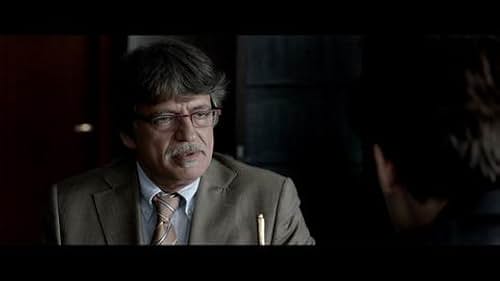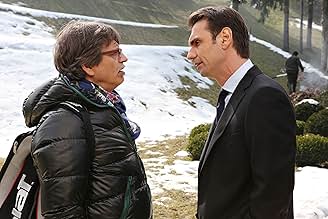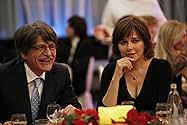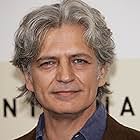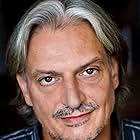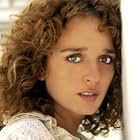The destinies of two families are irrevocably tied together after a cyclist is hit off the road by a jeep in the night before Christmas Eve.The destinies of two families are irrevocably tied together after a cyclist is hit off the road by a jeep in the night before Christmas Eve.The destinies of two families are irrevocably tied together after a cyclist is hit off the road by a jeep in the night before Christmas Eve.
- Awards
- 47 wins & 30 nominations
Michael Sart
- Jean Louis, l'assistente di Bernaschi
- (as Nicola Centonze)
Storyline
Did you know
- TriviaOfficial submission of Italy to the best foreign language film category of the 87th Academy Awards 2015.
- ConnectionsFeatures Nostra signora dei turchi (1968)
Featured review
In the closing moments of this intricate drama, "Human capital" is defined as an insurance industry term, referring to the way damages payouts are calculated upon death, partly dependent on the individual's "emotional bonds". But the phrase more broadly refers to the way that the productivity and creativity of people can be converted into economic value. These definitions tell us everything we need to know about the themes at hand in Paolo Virzì's deconstruction of the Italian upper middle.
Human Capital is Italy's entry for next year's Academy Awards, and it's not hard to see why. It's a handsome, solid, complex, character-driven drama with an already award-winning performance from Valeria Bruni Tedeschi at its centre. She plays Carla Bernaschi, the wife of a businessman on the cusp of ruin. She persuades him to buy her a crumbling theatre – a pet project – as a gift. But it quickly becomes apparent that the theatre isn't economically viable. It'll have to be converted into flats instead.
The film is full of such soul-crushing moments. One needn't look far for metaphors. The various subplots revolve around a car crash (The Crash), and the fallout which threatens to ruin those at the bottom of the social ladder, leaving those at the top untainted. One needn't, also, look far for comparisons: Paul Haggis's award-friendly Crash, and the work of Alejandro Iñárritu, in the way that chronologically concurrent stories are shown one after another.
But Virzì's film is less aggravatingly worthy than the work of Haggis and less laborious than Iñárritu's English-language work. Indeed, the first of four "chapters" plays out with wicked dry humour, as Dino Ossola (Fabrizio Bentivoglio) desperately claws at the deal of a lifetime in order to break into the business elite. He's trying to seduce that wretched husband of Carla's, Giovanni (Fabrizio Gigfuni), but he only recognises the capital, not the humanity. It leaves Carla bereft; searching for meaning and affection. Meanwhile, both the Ossolas and the Bernaschis are bound by their kids. Serena Ossola (Matilde Gioli, resembling a younger Eva Green) knows something about the car crash, and the cost of keeping or revealing the secret is where the real meaning of the film's title will become known.
Virzì's style starts out dead pretty; all fairy tale lighting and wintry wonderlands, mirroring the illusory worlds the wealthy (or would-be-wealthy) inhabit. But as the cost of these characters' decisions become known, the camera leaves the tripod and the style gets grittier. Virzì is clearly aware of the inherent humour and horror in seeing the same events from multiple perspectives. While comedy gives way to tragedy, the twists and turns don't feel manipulative, and ultimately this is a story imbued with hope. In part this is due to the villain of the piece – the apparently heartless Giovanni – never being reduced to a mere monster.
The structure does mean that at times the chronology of events becomes muddled. It's not always completely clear how much time is supposed to have passed between scenes, leading to some false impressions of certain relationships. And, inevitably for such a tightly woven story, narrative contrivance and convenience is never far away. But then, what does one expect from a morality play? And a thoroughly modern one at that. This is an intelligent, accessible film, wise to focus on the most interesting characters in the room: those on the margins; those with most to lose. A fine contender.
Human Capital is Italy's entry for next year's Academy Awards, and it's not hard to see why. It's a handsome, solid, complex, character-driven drama with an already award-winning performance from Valeria Bruni Tedeschi at its centre. She plays Carla Bernaschi, the wife of a businessman on the cusp of ruin. She persuades him to buy her a crumbling theatre – a pet project – as a gift. But it quickly becomes apparent that the theatre isn't economically viable. It'll have to be converted into flats instead.
The film is full of such soul-crushing moments. One needn't look far for metaphors. The various subplots revolve around a car crash (The Crash), and the fallout which threatens to ruin those at the bottom of the social ladder, leaving those at the top untainted. One needn't, also, look far for comparisons: Paul Haggis's award-friendly Crash, and the work of Alejandro Iñárritu, in the way that chronologically concurrent stories are shown one after another.
But Virzì's film is less aggravatingly worthy than the work of Haggis and less laborious than Iñárritu's English-language work. Indeed, the first of four "chapters" plays out with wicked dry humour, as Dino Ossola (Fabrizio Bentivoglio) desperately claws at the deal of a lifetime in order to break into the business elite. He's trying to seduce that wretched husband of Carla's, Giovanni (Fabrizio Gigfuni), but he only recognises the capital, not the humanity. It leaves Carla bereft; searching for meaning and affection. Meanwhile, both the Ossolas and the Bernaschis are bound by their kids. Serena Ossola (Matilde Gioli, resembling a younger Eva Green) knows something about the car crash, and the cost of keeping or revealing the secret is where the real meaning of the film's title will become known.
Virzì's style starts out dead pretty; all fairy tale lighting and wintry wonderlands, mirroring the illusory worlds the wealthy (or would-be-wealthy) inhabit. But as the cost of these characters' decisions become known, the camera leaves the tripod and the style gets grittier. Virzì is clearly aware of the inherent humour and horror in seeing the same events from multiple perspectives. While comedy gives way to tragedy, the twists and turns don't feel manipulative, and ultimately this is a story imbued with hope. In part this is due to the villain of the piece – the apparently heartless Giovanni – never being reduced to a mere monster.
The structure does mean that at times the chronology of events becomes muddled. It's not always completely clear how much time is supposed to have passed between scenes, leading to some false impressions of certain relationships. And, inevitably for such a tightly woven story, narrative contrivance and convenience is never far away. But then, what does one expect from a morality play? And a thoroughly modern one at that. This is an intelligent, accessible film, wise to focus on the most interesting characters in the room: those on the margins; those with most to lose. A fine contender.
- How long is Human Capital?Powered by Alexa
Details
- Release date
- Countries of origin
- Official sites
- Languages
- Also known as
- El capital humano
- Filming locations
- Fortunago, Pavia, Lombardia, Italy(villa Bernaschi)
- Production companies
- See more company credits at IMDbPro
Box office
- Budget
- €6,000,000 (estimated)
- Gross US & Canada
- $158,549
- Opening weekend US & Canada
- $21,669
- Jan 19, 2015
- Gross worldwide
- $9,113,941
- Runtime1 hour 51 minutes
- Color
- Sound mix
- Aspect ratio
- 2.35 : 1
Contribute to this page
Suggest an edit or add missing content


